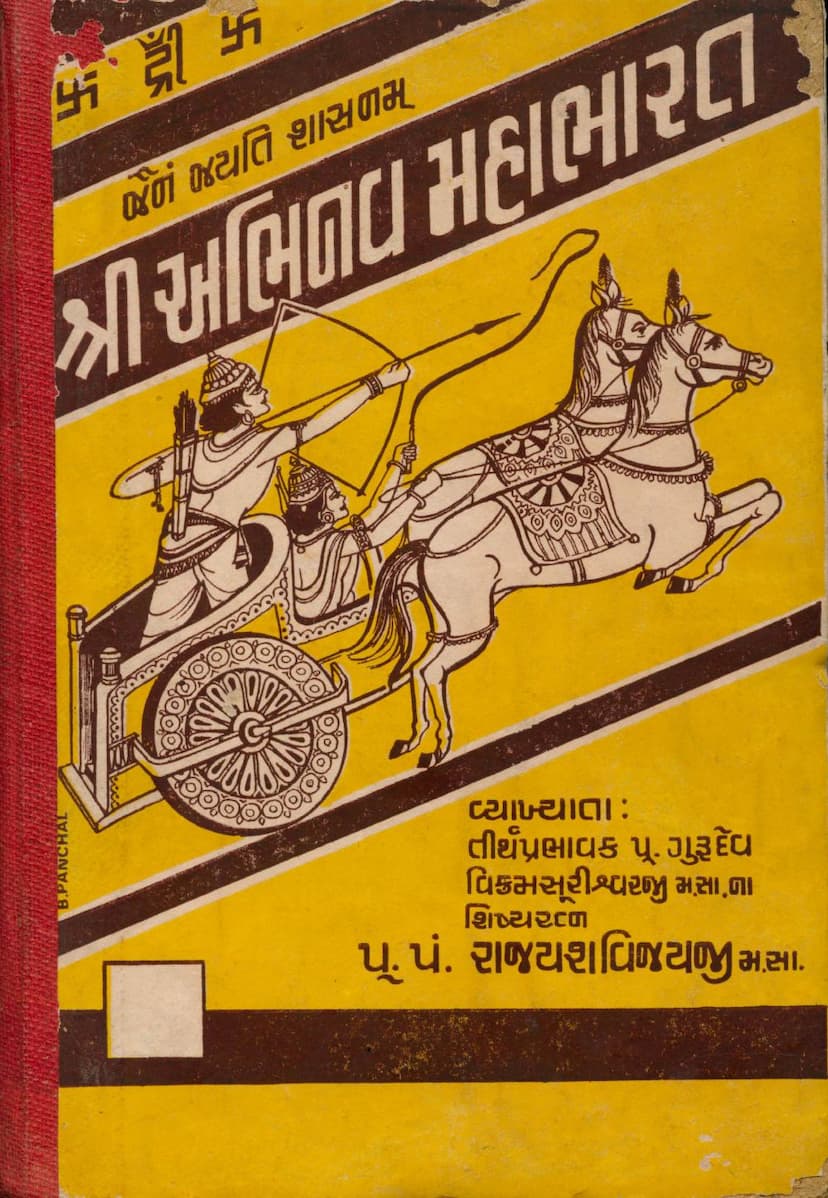Abhinav Mahabharat
Added to library: September 1, 2025

Summary
Here's a summary of the Jain text "Abhinav Mahabharat" based on the provided pages:
Title: Abhinav Mahabharat (New Mahabharat) Author: Pujya Panyas Rajyashvijayji M.S. Publisher: Shri Labdhivikramsuri Sanskruti Kendra
Overview:
"Abhinav Mahabharat" is a Jain rendition of the epic Mahabharata, presented as a series of discourses (pravachans) by the learned scholar and orator Pujya Panyas Rajyashvijayji M.S., under the auspicious guidance of Pujya Acharya Bhagwant Vikramsurishwarji M.S. The text aims to retell the Mahabharata narrative from a Jain perspective, highlighting Jain principles and philosophy within the epic's framework. The discourses were initially delivered weekly and then published in parts.
Key Aspects:
- Jain Interpretation: The work adapts the grand Mahabharata narrative to align with Jain teachings and ethical values. It draws upon Jain scriptures and traditions to interpret the events and characters of the epic.
- Author's Inspiration and Style: The author, Rajyashvijayji M.S., was inspired by the powerful discourses of his guru, who found his interpretations of the Ramayana particularly impactful. The discourses are noted for their captivating style, blending profound spiritual insights with relatable narratives, moral lessons, and even humor.
- Gurutradition (Guru Parampara): The text emphasizes the importance of the guru-shishya tradition, tracing the lineage of the author and his spiritual mentors, highlighting the knowledge passed down through generations of Jain scholars.
- Compilation and Publication: The publication of "Abhinav Mahabharat" was a significant undertaking, involving the collaboration of the Shri Labdhivikramsuri Sanskruti Kendra, the Shri Shantinagar Jain Shvetamber Murtipujak Sangh, and a dedicated publication committee. Numerous donors contributed to make this extensive work possible, with thanks extended to specific individuals and organizations for their generous support.
- Narrative Focus: The book begins by recounting the lineage and early life of key Mahabharata characters, starting with the birth of Bhishma (Gangeya). It delves into the intricate family relationships, significant events, and moral dilemmas faced by the characters. The initial sections cover:
- The birth of Bhishma and his vow.
- The story of King Shantanu and his interactions with Ganga.
- The birth of Dhritarashtra, Pandu, and Vidur.
- The marriage arrangements for Pandu and the introduction of Kunti.
- The birth of Krishna and the political landscape involving Kansa and Ugrasena.
- The early life of Krishna, his divine nature, and his eventual confrontation with Kansa.
- The birth of the Pandavas and the Kauravas.
- The education and early life of the princes, including their interactions with gurus like Dronacharya.
- The pivotal event of Draupadi's Swayamvar and the subsequent marriage.
- The detailed accounts of the birth of Pandu's sons and the birth of the Kauravas.
- The text also includes discussions on philosophical concepts, ethical dilemmas, and the importance of adherence to Dharma.
- Reader Feedback: The book includes positive feedback from readers, appreciating the engaging narrative style, the depth of contemplation, and the spiritual inspiration derived from the discourses.
- Structure: The book is divided into various "Shrenis" (series) or chapters, detailing specific episodes and characters from the Mahabharata. The initial volumes cover the early life and major events leading up to the major conflicts. The table of contents indicates a detailed exploration of individual episodes and character arcs.
- Philosophical Insights: Beyond the narrative, the discourses often touch upon Jain philosophy, emphasizing concepts like detachment, righteousness, the consequences of actions (karma), and the path to spiritual liberation.
In essence, "Abhinav Mahabharat" is a comprehensive Jain adaptation of the Mahabharata, offering a spiritually enriching and ethically guided retelling of the epic for its followers.